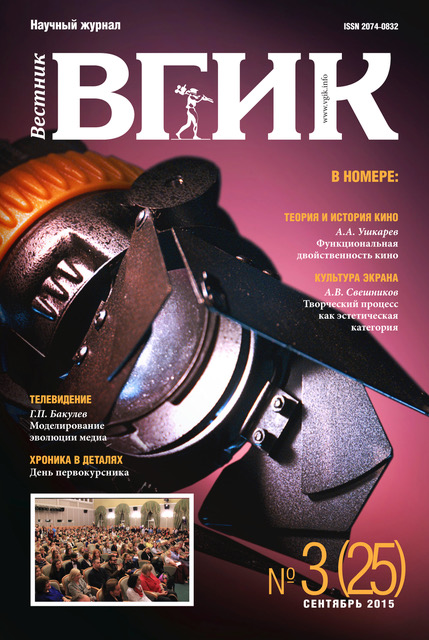Media Evolution Emulation
- Authors: Bakulev G.P1
-
Affiliations:
- VGIK
- Issue: Vol 7, No 3 (2015)
- Pages: 143-151
- Section: TELEVISION | DIGITAL ENVIRONMENT
- URL: https://journals.eco-vector.com/2074-0832/article/view/14762
- DOI: https://doi.org/10.17816/VGIK73143-151
- ID: 14762
Cite item
Full Text
Abstract
The article researches the methods of media evolution emulation. The author believes that communication media undergo the same stages as any other technology which can be roughly described as emergence, development and disappearance and gives a thorough insight into the evolution of media (as exemplified by the Internet) as a natural life cycle. Here, two approaches - technological determinism and social constructivism - are merged into a sub-theory called media-constructivism stating that constant interplay of new and old media is the main factor determining the result and direction of a new medium’s evolution. This linear interpretation is opposed by a multilevel pattern taking into account economic, political, social, cultural and other factors. It is also pointed out that each medium does not evolve separately but in constant intercommunication.
About the authors
Gennady P Bakulev
VGIK
Author for correspondence.
Email: editor@vestnik-vgik.com
PhD (Philology), professor, Russian and Foreign Languages Department
References
- Бакулев Г.П. Массовая коммуникация. Западные теории и концепции. - М.: Аспект Пресс, 2010. -192 с.
- Lehman-Wilzig, S. & Cohen-Avigdor, N. The natural life cycle of new media evolution: inter-media struggle for survival in the internet age. New Media & Society 2004; N 6. - P. 707-730.
- McLuhan, M. and McLuhan, E. (1988). Laws of Media: The New Science. - Toronto, Canada: University of Toronto Press. 1988.
- Rogers, E.M. (1983). Diffusion of Innovation. (4th edn). - New York: Free Press. - 453 p.
- Scolari, C.A. (2012). Media ecology: Exploring the metaphor to expand the theory. Communication Theory, 22 (2). - P. 204-225.
- Scolari, C.A. (2013). Media Evolution: Emergence, Dominance, Survival, and Extinction in the Media Ecology. International Journal of Communication, 7. - P 1418-1441.
Supplementary files








